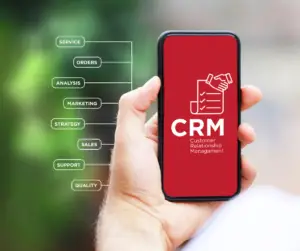Introduction
Customer Relationship Management (CRM) systems have become a cornerstone of modern business operations. Gone are the days of relying on scattered spreadsheets and sticky notes to track customer interactions. Today’s CRMs offer a robust suite of features designed to streamline sales processes, enhance customer service, and ultimately, boost your bottom line.
Whether you’re a small business owner or managing a large enterprise, implementing a CRM system can significantly improve your organization’s efficiency and effectiveness. But with so many CRM options available, it can be overwhelming to determine which features are most crucial for your specific needs.

We will explores 7 essential CRM features you can’t ignore to maximize your sales and efficiency. By leveraging these functionalities, you can gain a competitive edge, build stronger customer relationships, and achieve sustainable business growth.
1. Sales Pipeline Management
A well-defined sales pipeline is the backbone of any successful sales strategy. It provides a clear visual representation of your sales process, allowing you to track the progress of potential deals and identify potential bottlenecks.
A CRM system with robust pipeline management features empowers you to:
- Create and customize sales stages: Define the different stages your leads progress through, from initial contact to closed deal.
- Visualize your pipeline: Gain a real-time overview of your sales pipeline using customizable dashboards and reports.
- Forecast sales performance: Utilize historical data and pipeline insights to make informed sales forecasts and set realistic goals for your team.
- Manage opportunities: Assign leads to specific sales reps, track deal value and probability of closure, and set reminders for follow-up activities.
By leveraging these features, you can streamline your sales process, optimize lead conversion rates, and close more deals faster.
2. Comprehensive Contact Management
Your customers are the lifeblood of your business. A CRM system should provide a centralized platform to manage all your customer interactions, ensuring you have a complete view of every touchpoint.
Effective contact management features allow you to:
- Store and organize customer data: Consolidate customer information, including contact details, purchase history, communication history, and preferences.
- Segment your customer base: Create targeted marketing campaigns and personalize customer experiences by segmenting your audience based on demographics, interests, and purchase behavior.
- Track customer interactions: Maintain a chronological record of all interactions with each customer, including emails, calls, meetings, and notes.
- Improve collaboration: Share customer data seamlessly across your sales, marketing, and customer service teams, fostering a more collaborative approach.
By having a centralized repository of customer information, your team can build stronger relationships, personalize interactions, and ultimately, drive customer loyalty.
3. Automated Lead Scoring and Lead Nurturing
In today’s competitive market, identifying and prioritizing high-potential leads is crucial for maximizing sales success. A CRM system with lead scoring capabilities can automate this process, allowing you to focus your efforts on the most promising leads.

Lead scoring assigns a numerical value to each lead based on pre-defined criteria such as demographics, website behavior, and engagement with marketing campaigns. This allows you to:
- Identify high-value leads: Prioritize your sales efforts by focusing on leads with the highest scores, indicating a greater likelihood of conversion.
- Automate lead nurturing: Set up automated email sequences and nurture campaigns to engage with lower-scoring leads and move them further down the sales funnel.
- Improve lead qualification: Qualify leads more effectively by automating the analysis of key data points, ensuring your sales team spends time with qualified prospects.
By leveraging lead scoring and nurturing functionalities, you can optimize your lead generation efforts, convert more leads into paying customers, and boost your sales ROI.
4. Powerful Marketing Automation Tools
- Integrate with marketing tools: Connect your CRM with popular marketing tools and platforms to streamline your marketing efforts and gain a holistic view of customer engagement.
By harnessing the power of marketing automation within your CRM, you can create personalized customer journeys, nurture leads more effectively, and achieve a higher return on investment (ROI) from your marketing campaigns.

5. Enhanced Customer Service Capabilities
Exceptional customer service is vital for building brand loyalty and driving repeat business. A CRM system can empower your customer service team to deliver a more efficient and personalized experience for your customers.
Key customer service features in a CRM system include:
- Ticketing and case management: Track customer service inquiries, assign them to relevant support agents, and monitor resolution progress.
- Self-service portal: Empower customers to find answers to common questions and resolve issues independently through a self-service portal within your CRM.
- Knowledge base management: Create a centralized repository of knowledge base articles and FAQs that your customer service team can utilize to answer customer inquiries efficiently.
- 360-degree customer view: Provide your customer service representatives with a complete view of each customer’s interaction history, allowing them to personalize support and offer a more positive experience.
By equipping your customer service team with the right tools, you can resolve customer issues faster, improve customer satisfaction, and foster long-term customer loyalty.

6. In-depth Reporting and Analytics
Data is the lifeblood of any successful business strategy. A CRM system should provide robust reporting and analytics functionalities to help you gain valuable insights into your sales, marketing, and customer service operations.
Effective reporting features allow you to:
- Track key performance indicators (KPIs): Monitor critical metrics such as sales pipeline progression, lead conversion rates, customer lifetime value, and customer satisfaction scores.
- Generate custom reports: Create customized reports to analyze specific aspects of your business and identify areas for improvement.
- Gain data-driven insights: Utilize the data collected through your CRM to make informed decisions about your sales and marketing strategies.
By leveraging the reporting and analytics capabilities of your CRM, you can identify trends, measure the effectiveness of your campaigns, and make data-driven decisions to optimize your overall business performance.
7. Seamless Cloud-Based Accessibility
In today’s mobile world, accessibility is paramount. A cloud-based CRM system allows your team to access customer data and manage interactions from anywhere, on any device. This empowers your team to:
- Work remotely: Your sales, marketing, and customer service teams can access the CRM and work productively from anywhere with an internet connection.
- Improve collaboration: Cloud-based CRMs facilitate seamless collaboration between team members, regardless of location.
- Enhanced data security: Cloud-based CRM providers offer robust security measures to ensure your valuable customer data is protected.
Choosing a cloud-based CRM solution offers greater flexibility, scalability, and security, making it a perfect fit for businesses of all sizes.
Conclusion
By implementing a CRM system with the features outlined above, you can significantly enhance your sales and marketing processes, deliver exceptional customer service, and ultimately, achieve sustainable business growth.
Choosing the Right CRM for Your Business
With a vast array of CRM options available, selecting the right solution for your specific needs is crucial.
Here are some key factors to consider when choosing a CRM:
- Industry-specific features: Certain CRMs cater to specific industries and offer specialized functionalities.
- Scalability: Choose a CRM that can grow and adapt alongside your business.
- Budget: CRM solutions come in various price ranges. Determine your budget and find a solution that offers the features you need at a reasonable cost.
- Ease of use: The CRM should be user-friendly and intuitive for your team to adopt seamlessly.
By carefully considering these factors, you can choose a CRM system that empowers your team, streamlines your operations, and drives long-term business success.
CloudTech ERP: Your One-Stop Shop for CRM Solutions
CloudTech ERP offers a comprehensive suite of cloud-based CRM solutions designed to cater to the needs of businesses of all sizes. Our user-friendly CRM systems are packed with powerful features to help you manage your sales pipeline, nurture leads, provide exceptional customer service, and gain valuable insights into your business performance.
Contact CloudTech ERP today to learn more about how our CRM solutions can help you boost your sales and efficiency.





